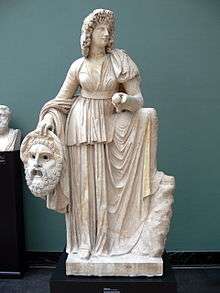Melpomene

Melpomene (/mɛlˈpɒmᵻniː/; Greek: Μελπομένη; "to sing" or "the one that is melodious"), initially the Muse of Chorus, she then became the Muse of Tragedy, for which she is best known now.[1] Her name was derived from the Greek verb melpô or melpomai meaning "to celebrate with dance and song." She is often represented with a tragic mask and wearing the cothurnus, boots traditionally worn by tragic actors. Often, she also holds a knife or club in one hand and the tragic mask in the other.
Melpomene is the daughter of Zeus and Mnemosyne. Her sisters include Calliope (muse of epic poetry), Clio (muse of history), Euterpe (muse of lyrical poetry), Terpsichore (muse of dancing), Erato (muse of erotic poetry), Thalia (muse of comedy), Polyhymnia (muse of hymns), and Urania (muse of astronomy). She is also the mother of several of the Sirens, the divine handmaidens of Kore (Persephone/Proserpina) who were cursed by her mother, Demeter/Ceres, when they were unable to prevent the kidnapping of Kore (Persephone/Proserpina) by Hades/Pluto.
In Roman and Greek poetry, it was traditional to invoke the goddess Melpomene so that one might create beautiful lyrical phrases (see Horace's Odes).
See also
References
- ↑ Blyth, Charles (1990. Vol. 24, no. 3, pgs. 211-218.), Virgilian Tragedy and Troilus, The Chaucer Review Check date values in:
|date=(help)
External links
 Media related to Melpomene at Wikimedia Commons
Media related to Melpomene at Wikimedia Commons- Facebook Page for Melpomene
- Primary sources and basic information concerning Melpomene
- Warburg Institute Iconographic Database (ca 50 images of Melpomene)